It can be said without a doubt that the last words any human says before facing death are bound to be either creepy or just plain bizarre, especially when it's an inmate. Last words are inherently important to the people who hear them, even if they end up being nonsense, weird, or horrible.
While an average person may sit on their deathbed and thank their family for all the love they had over the years, death row inmates are wired a little differently than the rest of us. That means you may not get positive last words from them. You may not even get coherent last words. These people have lost part of their humanity.
Here we look at some death row inmates that came out with statements that bordered on the bizarre. These statements are going to give you the chill and might even give you a good laugh every once a life. But, there really is something about someone's last words that creeps us out. You won't believe what #41 had for his last meal!
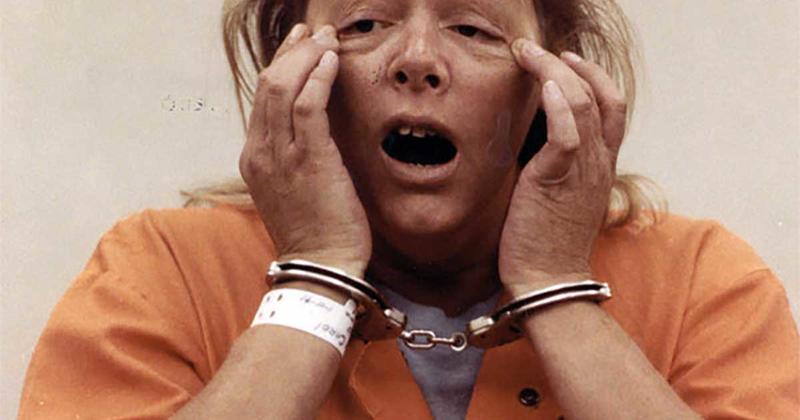
Jose Villegas was convicted of fatally stabbing his ex-girlfriend, her young son and her mother 13 years ago at a home in Corpus Christi, Texas. The lethal injection of Jose Villegas, 39, was carried out after his attorneys unsuccessfully argued to the U.S. Supreme Court that he was mentally impaired and ineligible for the death penalty.

"I would like to remind my children once again I love them," Villegas said when asked if he had a statement before being put to death. "Everything is OK. I love you all, and I love my children. I am at peace." Just as the dose of pentobarbital began taking effect, he said, "It does kind of burn. Goodbye." He gasped several times, then began breathing quietly. Within less than a minute, all movement had stopped. Villegas was pronounced dead 11 minutes after being given a lethal dose of pentobarbital.
Thomas J. Grasso was a 32-year-old male double murderer executed by lethal injection at Oklahoma State Penitentiary, McAlester, Oklahoma, United States, on March 20, 1995. He strangled Hilda Johnson, an 87-year-old woman, using her Christmas tree lights on December 24, 1990, in her Tulsa home. He stole $8 from her purse, $4 in loose change, and her television set which he sold for $125. Six months later, after moving to New York with his wife, Lana, he murdered Leslie Holtz, an 81-year-old man from Staten Island, on July 4, 1991, stealing his Social Security check.

Grasso was Executed in Oklahoma on March 20, 1995 for a two murders. He requested his last meal to be Spaghettios, but instead he was given spaghetti and meatballs. His last words were "I did not get my SpaghettiOs, I got spaghetti. I want the press to know this."
Cobb, 29, spent a decade on death row for the murder of Kenneth Vandever, a man whom he abducted and later killed in a convenience store robbery 11 years ago. Cobb abducted Vandever, then 37, and two other women whom he shot with a shotgun and left for dead. The women survived to call police, but Vandever died. Cobb never denied his role in the murder.
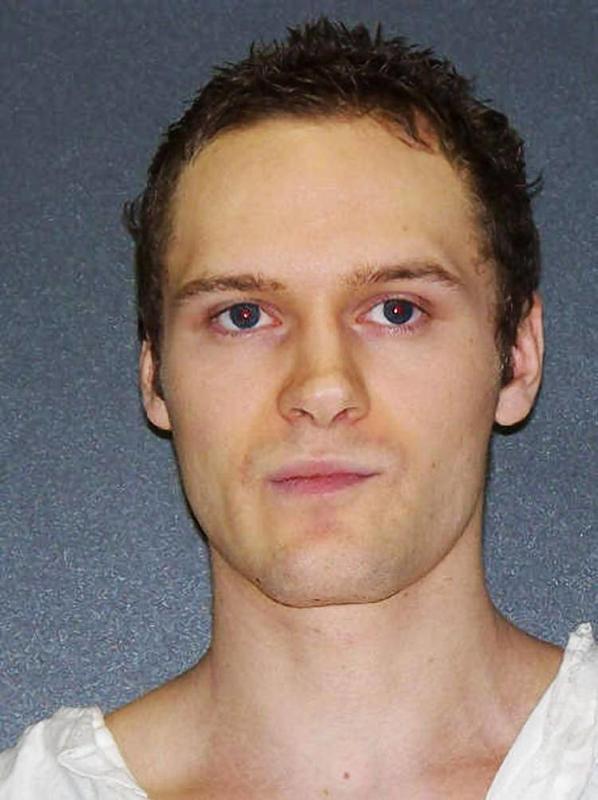
Right before execution, Richard Cobb stared into the face of the Texas prison warden who attended his execution Thursday night and told him that the lethal drugs just injected into his body were "awesome." 'Life is death, death is life. I hope that someday this absurdity that humanity has come to will come to an end,' Cobb said when asked for his last words. "Life is too short. I hope anyone that has negative energy towards me will resolve that. Life is too short to harbor feelings of hatred and anger. That's it, warden," he said according to an Associated Press reporter who witnessed the execution. But Cobb wasn't finished. As the first injection entered his bloodstream, Cobb lifted his head from the gurney on which he was tied down, and craned his neck to stare at the warden who stood behind him. "Wow!" Cobb shouted. "That is great. That is awesome! Thank you, warden! Thank you (expletive) warden!" he said. Soon after the outburst, "his head fell back on the pillow, and his neck twisted at an odd angle, with his mouth and eyes open," the AP reported.
Fifteen minutes later he was declared dead.
Jim was one of Ted Bundy's lawyers, Fred was the minister who had spent the night with him. He turned down his last mean. Bundy was an American serial killer, kidnapper, rapist, burglar, and necrophile who assaulted and murdered numerous young women and girls during the 1970s and possibly earlier. Shortly before his execution and after more than a decade of denials, he confessed to 30 homicides that he committed in seven states between 1974 and 1978. The true victim count will forever be unknown and could be much higher than the number to which Bundy confessed.

Many of Bundy's young female victims regarded him as handsome and charismatic, which were traits that he exploited to win their trust. He would typically approach them in public places, feigning injury or disability, or impersonating an authority figure, before overpowering and assaulting them at more secluded locations. He sometimes revisited his secondary crime scenes for hours at a time, grooming and performing sexual acts with the decomposing corpses until putrefaction and destruction by wild animals made further interaction impossible. He decapitated at least 12 of his victims, and for a period of time, he kept some of the severed heads as mementos in his apartment. On a few occasions, he simply broke into dwellings at night and bludgeoned his victims as they slept. Bundy was executed in the electric chair at Florida State Prison on January 24, 1989. Biographer Ann Rule described him as "a sadistic sociopath who took pleasure from another human's pain and the control he had over his victims, to the point of death, and even after". He once called himself "the most cold-hearted son of a bitch you'll ever meet"; Attorney Polly Nelson-a member of his last defense team-wrote: "Ted was the very definition of heartless evil."
Jimmy L. Glass was an American convicted murderer, executed by the state of Louisiana. He is probably best known not for his crime, but as petitioner in the U.S. Supreme Court case Glass v. Louisiana. Before committing a capital crime, Glass already had a criminal record. With fellow inmate Jimmy Wingo, Glass escaped from the Webster Parish, Louisiana Jail in December 1982 and, during their escape, they killed Newton Brown (born 1927) and his wife, Erlene Nealy Brown (born 1931), at their home in Dixie Inn outside Minden. The Browns' son, Gary Lamar Brown, was the son-in-law of Judge Charles A. Marvin (1929-2003) of the Louisiana Court of Appeal for the Second Circuit, based in Shreveport. Glass and Wingo were soon arrested. Both were sentenced to death in the electric chair.

Glass made a headlines in 1985 as a petitioner in a Supreme Court case. He argued that executions by electrocution violate the Eighth and Fourteenth Amendments to the United States Constitution as "cruel and unusual punishment". But the Court, by majority 5-4, found that electrocution as an authorized method of executions is constitutional. Glass was electrocuted on June 12, 1987 at the age of twenty-five and became the 78th person executed in the United States since 1977. Governor Edwin W. Edwards refused commutation of the sentence. Wingo was executed four days later, on June 16, 1987.
On his way to his execution, Gacy told a prison guard, "Kiss my ass," according to his hometown newspaper, the Chicago Tribune. Last Meal: 12 fried shrimp, a 12-piece bucket of original recipe KFC chicken, french fries, and a pound of strawberries. Gacy was an American serial killer and rapist. He sexually assaulted, tortured and murdered at least 33 teenage boys and young men between 1972 and 1978 in Cook County, Illinois (a part of metropolitan Chicago).

All of Gacy's known murders were committed inside his Norwood Park ranch house. His victims were typically induced to his address by force or deception, and all but one of his victims were murdered by either asphyxiation or strangulation with a makeshift tourniquet; his first victim was stabbed to death. Gacy buried 26 of his victims in the crawl space of his home. Three other victims were buried elsewhere on his property, while the bodies of his last four known victims were discarded in the Des Plaines River. Convicted of 33 murders, Gacy was sentenced to death on March 13, 1980, for 12 of those killings. He spent 14 years on death row before he was executed by lethal injection at Stateville Correctional Center on May 10, 1994.
Gacy became known as the "Killer Clown" because of his charitable services at fund-raising events, parades, and children's parties where he would dress as "Pogo the Clown", a character he had devised.
George Appel was convicted of first-degree murder for killing a police officer in New York City in 1928. The court sentenced him to death by electric chair. While being strapped to the fatal device, he laughed to the officers: "Well, gentlemen, you are about to see a baked Appel."

Although the electric chair has long been a symbol of the death penalty in the United States, its use is in decline due to the rise of lethal injection, which is widely believed to be a more humane method of execution. Although some states still maintain electrocution as a method of execution, today, it is only maintained as a secondary method that may be chosen over lethal injection at the request of the prisoner, except in Tennessee, where it may be used if the drugs for lethal injection are not available, without input from the prisoner. As of 2014, electrocution is an optional form of execution in Alabama, Florida, South Carolina, and Virginia. They allow the prisoner to choose lethal injection as an alternative method. In the state of Kentucky, the electric chair has been retired, except for those whose capital crimes were committed prior to March 31, 1998, and who choose electrocution; inmates who do not choose electrocution and inmates who committed their crimes after the designated date are executed by lethal injection.
Herman Webster Mudgett (May 16, 1861 - May 7, 1896), better known as Dr. Henry Howard Holmes or more commonly known as H. H. Holmes, was an American serial killer of the 19th century. While he confessed to 27 murders, only nine could be plausibly confirmed and several of the people whom he claimed to have murdered were still alive. He is commonly said to have killed as many as 200, though this figure is only traceable to 1940s pulp magazines. Many victims were said to have been killed in a mixed-use building which he owned, located about 3 miles (4.8 km) west of the 1893 World's Fair: Columbian Exposition, supposedly called the World's Fair Hotel (informally called "The Murder Hotel"), though evidence suggests that the hotel portion was never truly open for business.

Besides being a serial killer, Holmes was also a con artist and a bigamist, the subject of more than 50 lawsuits in Chicago alone. Many now-common stories of his crimes sprang from fictional accounts that later authors took for fact; however, in a 2017 biography, Adam Selzer wrote that Holmes' story is "effectively a new American tall tale - and, like all the best tall tales, it sprang from a kernel of truth". H. H. Holmes was executed on May 7, 1896, nine days before his 35th birthday, for the murder of his friend and accomplice Benjamin Pitezel. During his trial for the murder of Pitezel, H. H. Holmes confessed to numerous other killings.
Green was convicted in 2002 of the abduction, rape and strangling of neighbor Christina Neal, snatched as she walked home on June 21, 2000, according to the Texas attorney general's summary of the case. Investigators became suspicious of Green after they learned he had been burning trash soon after the girl's disappearance. They got a warrant to search his property, discovering a shallow grave and inside the house, tucked behind a chair, Christina's body stuffed inside a bag.

He was sentenced to death by lethal injection. Asked by the warden if he had a statement from the death chamber gurney, Green shook his head and replied: 'No', but seconds later he changed his mind. Green's last statement was: "I'm an innocent man. I did not kill anyone. Y'all are killing an innocent man. My left arm is killing me, it hurts bad." But almost immediately he began snoring loudly. The sounds stopped after about six breaths.
Carl Panzram was an American serial killer, rapist, arsonist, and burglar. In prison confessions and his autobiography, he claimed to have committed 21 murders, most of which could not be corroborated, and over 1,000 sodomies of boys and men. After a series of imprisonments and escapes, he was executed in 1930 for the murder of a prison employee at Leavenworth Federal Penitentiary.

Panzram was hanged on September 5, 1930. As guards attempted to place a black hood over his head, he allegedly spat in the executioner's face. When asked for any last words, he responded, "Yes, hurry it up, you Hoosier bastard! I could kill a dozen men while you're screwing around!" His grave, at the Leavenworth Penitentiary Cemetery, is marked only with his prison number, 31614.
Kurten was a German serial killer known as both The Vampire of Dusseldorf and the Dusseldorf Monster, who committed a series of murders and sexual assaults between February and November 1929 in the city of Dusseldorf. In the years prior to these assaults and murders, Kurten had amassed a lengthy criminal record for offenses including arson and attempted murder. He also confessed to the 1913 murders of a 9-year-old girl in Mulheim am Rhein, and a 17-year-old girl in Loscheckes.

Described by Karl Berg (de) as "the king of the sexual perverts," Kurten was found guilty of nine counts of murder and seven counts of attempted murder for which he was sentenced to death by beheading in April 1931. He was subsequently executed in July 1931. Kurten became known as The Vampire of Dusseldorf as he occasionally made attempts to drink the blood from his victims' wounds, and the Dusseldorf Monster both because the majority of his murders were committed in and around the city of Dusseldorf, and the savagery he inflicted upon his victims' bodies. He requested the following as his last meal: Wiener Schnitzel, fried potatoes, and white wine.
James Jackson was executed in Texas by lethal injection on Feb. 7, 2007 for the 1997 strangling murders of his wife and two stepdaughters. James Jackson thanked his family and said he loved them. "See you all on the other side," he told witnesses that included a brother and sister. Jackson then told the warden standing over him, "Warden, murder me ... I'm ready to roll. Time to get this party started."
Seven minutes later, at 6:18 p.m., he was pronounced dead.

The 6-foot-7 Jackson, known to fellow death row inmates as "Big Jack," insisted he wasn't responsible for the April 9, 1997 slayings of Sonceria "Sonnie" Mayes, 19, and her sister Ericka, 18, at the apartment they shared with Jackson and his wife, Sharon, 39. Sharon Jackson, the girls' mother, also was murdered. Prosecutor Julian Ramirez called it "an open-and-shut case." In a confession introduced into evidence, Jackson said he killed the women, and a note left at the crime scene said he "gave them back to God." Evidence showed Jackson pawned the woman's sewing machine and used the money to buy drugs.
Kimberly McCarthy was an American death row inmate who was convicted and sentenced to death for the 1997 murder of her neighbor, 71-year-old retired college professor Dorothy Booth, in her Lancaster, Texas (Dallas-Fort Worth area) home during a robbery. She was also a suspect in the murders of two other elderly Texas women, for which she was never tried.

After her final federal appeal was denied in July 2012, her execution date was set for January 29, 2013. Two reprieves pushed her execution date to June 26, 2013. McCarthy continued to proclaim her innocence, and stated that she was framed for murder. On June 26, 2013 McCarthy was executed by the state of Texas by lethal injection, becoming the 500th person to be executed by the state of Texas using that method.
Jeffrey Lionel Dahmer (May 21, 1960 - November 28, 1994), also known as the Milwaukee Cannibal, was an American serial killer and sex offender, who committed the rape, murder, and dismemberment of 17 men and boys between 1978 and 1991. Many of his later murders involved necrophilia, cannibalism, and the permanent preservation of body parts-typically all or part of the skeleton.

Although diagnosed with borderline personality disorder, schizotypal personality disorder, and a psychotic disorder, Dahmer was found to be legally sane at his trial. Convicted of 15 of the 16 murders he had committed in Wisconsin, Dahmer was sentenced to 15 terms of life imprisonment on February 15, 1992. He was later sentenced to a 16th term of life imprisonment for an additional homicide committed in Ohio in 1978. On November 28, 1994, Dahmer was beaten to death by Christopher Scarver, a fellow inmate at the Columbia Correctional Institution, and claimed "I don't care if I live or die, go ahead and kill me" were his last words.
Clarence Ray Allen was an American criminal who was executed by lethal injection at San Quentin State Prison in California for the murders of three people. At age 76 in 2006, he became the second-oldest inmate to be executed in the United States since 1976, after John B. Nixon, who was executed in Mississippi in December 2005 at age 77. Pro-death penalty activists cite Allen's actions as a reason to support capital punishment in the United States. He was already serving a life sentence for one murder when he was convicted of organizing the killing of three more people.

While in prison, Allen then acknowledged his Native American Choctaw heritage. He also claimed to be deaf, blind and severely disabled, requiring a wheelchair for mobility. He did not know any sign language to communicate with hearing people. During his execution, he was able to walk from his wheelchair to the death podium unassisted. In addition, he appeared to be looking straight at his family prior to receiving the first dose of drugs during his lethal injection procedure. His last words were "My last words will be, Hoka hey, it's a good day to die." Hoka hey is a Western Sioux Indian term loosely translated to "hurry hurry".
Harris won money playing craps and used it to buy 2 machine guns. After giving them to a friend, Michael Taylor, for safekeeping, he came back later demanding the firearms. Stanley "Hank" Willoughby had assisted Taylor in hiding the firearms, and Willoughby was aided by two children. When Willoughby told Harris that he did not know where the firearms were, the argument grew heated. Harris pulled a .41 revolver and shot Willoughby in the face. Harris was arrested 2 weeks later for an armed robbery in Columbia. In 1982, Harris was convicted of Robbery in the First Degree and sentenced to 8 years imprisonment.

During his trial Harris admitted killing Willoughby but said it was in self-defense during an argument in a drug house. "I was afraid for my life," he testified. At the time, Harris had gained a reputation as one of the most prolific robbers in recent Kansas City history. He had five felony convictions but had beaten at least four armed-robbery charges. Authorities called him the "top of his field." Defense attorneys said the previous convictions influenced the jury to find him guilty. George Harris, 41, was sentenced to death by lethal injection for the murder of 20-year-old Stanley Willoughby of Kansas City in March 1989.
Westley Allan Dodd (July 3, 1961 - January 5, 1993) was an American serial killer and child molester. His execution (which was performed at his own request) on January 5, 1993 was the first legal hanging in the United States since 1965. Less than four years elapsed between the murders and Dodd's execution. He refused to appeal his case or the capital sentence. He insisted that he was uncontrollable and would kill again, stating in one court brief: "I must be executed before I have an opportunity to escape or kill someone else. If I do escape, I promise you I will kill and rape again, and I will enjoy every minute of it". He also said in some interviews that death would give him relief from guilt over the murders. During his trial, he wrote a pamphlet on how parents could protect children from child molesters such as himself.

By Washington state law, Dodd had to choose one of two methods for his execution: lethal injection or hanging. He chose hanging, later stating in interviews that he chose that method "because that's the way Lee Iseli [his final victim] died." His hanging was the first use of that method for an execution in the United States since George York and James Latham were hanged by Kansas in 1965. His execution was witnessed by 12 members of local and regional media, prison officials, and representatives of the families of the three victims. He ate salmon and potatoes for his last meal. His last words, spoken from the second floor of the indoor gallows, were recorded by the media witnesses as: "I was once asked by somebody, I don't remember who, if there was any way sex offenders could be stopped. I said, 'No.' I was wrong. I was wrong when I said there was no hope, no peace. There is hope. There is peace. I found both in the Lord, Jesus Christ. Look to the Lord, and you will find peace."
Matthews and Tracy Dyer stormed into the home of Matthews' 77 year old great uncle, Otis Short, east of Rosedale intending to rob him. Matthews shot Short once in the head at close range with a .45-caliber pistol and Dyer cut the throat of Short's wife, Minnie Short. The men fled in Otis Short's truck with $500 in cash and a .32-caliber pistol. Minnie Short survived and died later of natural causes. The murder weapon was found buried in a field behind Matthews house, and found a prescription bottle of xanax issued to Minnie short in his home. Dyer, 36, pled guilty to first-degree murder and was sentenced to life in prison without the possibility of parole. He testified against Matthews at trial. In 1996 he recanted, and after Matthews case was reversed on appeal, testified on his behalf at the retrial. The result was the same.

The state of Oklahoma put Matthews to death, after his execution date was put off several times, once by a debate over the drugs to be administered in the lethal injection.
G.W. Green was one of three gunmen who broke into a house 15 years ago, terrorized a family and then killed the father. The 54-year-old prisoner, G. W. Green, was put to death seven hours after the United States Supreme Court refused, on a vote of 7 to 2, to grant him a stay based on his argument of ineffective assistance of counsel.

Green, strapped to a gurney in the death chamber, greeted his brother, a sister and a friend who had arrived to witness the execution, expressed his love and then told the warden, Jack Pursley: "Lock and load. Let's do it, man." As lethal drugs flowed into his arms, he used an obscenity to describe life, gasped once and made no further movement. He was pronounced dead at seven minutes after the drugs began flowing. Mr. Green's brother, Bobby, growled at state officials as he left the death chamber, "Hope you all are happy", expressing no remorse.
Edward Ellies was executed by injection for strangling an elderly woman at a Houston apartment complex where he had been dismissed as a maintenance worker. The 38-year-old prisoner, Edward Ellis, was put to death after the United States Supreme Court refused to grant a stay based on his lawyers' claim of new evidence that another man, who died a year ago, was the killer. The victim of the slaying was Bertie Elizabeth Eakens, 74, who was found strangled in her bathtub at a complex where Mr. Ellis had earlier been dischared on suspicion of stealing from apartments. Mrs. Eakens's killing was one of three in 1983 that became known as the Houston bathtub slayings.

Ellis became the 46th person executed in Texas since the Supreme Court in 1976 allowed the resumption of capital punishment. The total is the highest of any state.
Comer was convicted in a 1987 crime spree in which he killed a fellow camper at Apache Lake east of Phoenix. He also was convicted of repeatedly raping a female camper the same night, once in front of her boyfriend. "This is my life. I made the decision to pull my appeals," Comer said, according to transcripts from a 2002 competency hearing. "Remember I stuck a gun in the guy's ear and pulled the trigger, scrambled his brains, right? You sentenced me to die. You have that right in this state. I don't see where the big problem is."

Comer took a picture of his daughter into the death chamber with him and seemed defiant as he smiled and maintained eye contact with his witnesses as drugs coursed through his body. His last words were "Go Raiders!" (referring to the NFL football team) and with that, his smile slowly faded until he passed out. His chest stopped moving after the third drug was given to him. By 10:08 a.m. he was dead. Just hours before his execution, Comer told prison workers "I am ready." He requested fried okra, four buns with butter, salt, two slices of banana bread for his last meal.
Gary Gilmore was an American criminal who gained international attention for demanding the implementation of his death sentence for two murders he committed in Utah. After the U.S. Supreme Court upheld a new series of death penalty statutes in the 1976 decision Gregg v. Georgia, he became the first person in almost ten years to be executed in the United States.

These new statutes avoided the problems under the 1972 decision in Furman v. Georgia, which had resulted in earlier death penalty statutes being deemed as "cruel and unusual" punishment, and therefore unconstitutional. (The Supreme Court had previously ordered all states to commute death sentences to life imprisonment after Furman v. Georgia.) Gilmore was executed by firing squad in 1977. His life and execution were the subject of the 1979 nonfiction novel The Executioner's Song by Norman Mailer, and 1982 TV film of the novel starring Tommy Lee Jones as Gilmore. His last meal: a hamburger, hard-boiled eggs, a baked potato, a few cups of coffee, and three shots of Jack Daniel's.
On July 5, 1978, Harris and his younger brother commandeered a car occupied by two 16-year-old boys, John Mayeski and Michael Baker, ordered them to drive to a remote area, then killed them. The brothers then used the boys' car as their getaway car when they robbed a San Diego bank. Harris was arrested less than an hour after the robbery and charged with murder, auto theft, kidnapping, burglary, and bank robbery. Coincidentally, one of the arresting officers, Steve Baker, was the father of one of the murdered boys, but did not realize that fact until later. Robert Harris was convicted and sentenced to death on March 6, 1979. After a series of appeals and stays of execution, Harris was executed in San Quentin's gas chamber on April 21, 1992.

Harris' execution is specifically remembered for his peculiar choice of final words (recorded by Warden Daniel Vasquez): "You can be a king or a street sweeper, but everybody dances with the grim reaper," a slight misquotation of a line from the 1991 film Bill & Ted's Bogus Journey. His last meal: A 21-piece bucket of original recipe KFC chicken, two large Domino's pizzas, a bag of jelly beans, a six-pack of Pepsi, and a pack of Camel cigarettes.
French was an American criminal who was the last person executed under Oklahoma's death penalty laws prior to Furman v. Georgia, which suspended capital punishment in America from 1972 until 1976. He was also the only prisoner executed in the United States that year. Already in prison for life for killing a motorist who had picked him up from hitchhiking in 1958, allegedly French desired to die but lacked the courage to commit suicide; and so instead murdered his cellmate, apparently to compel the state to execute him. French subsequently "resisted all efforts to spare his life" and walked calmly into the execution chamber at 10:00 p.m; the Associated Press reporter at the scene wrote that "James Donald French got what he demanded: death in the electric chair," and commented that "He faced death with the same cockiness he faced life.

In later years, French's last words before his death by electric chair would be said to have been "How's this for your headline? 'French Fries'". The story appeared as early as 1977 in The Book of Lists, but contemporaneous accounts of the execution mentioned only one of the "cocky" inmate's remarks, and reported that when prison warden Ray Page asked if French had any last words, "French replied: 'Everything's already been said.'"
On March 25, 1984 at the Missouri State Penitentiary in Jefferson City, Missouri between 12:00 p.m. and 1:00 p.m., Richard Zeitvogel strangled his cellmate, Gary Wayne Dew, with red double-strand wire leaving a distinctive pattern around the victim's neck. Zeitvogel later told authorities that he strangled Dew because he wanted to receive a death sentence so that he could room with capital punishment inmate Frank Guinan on death row.

Guinan and Zeitvogel had been co-defendants on a previous murder case which occurred at the Missouri State Penitentiary on January 25, 1981. Zeitvogel was later convicted of this charge and was sentenced to Life (50 years without parole). Guinan was executed at the Potosi Correctional Center on October 6, 1993 for this offense and a second death sentence he received in the murder of another inmate.
On 7 June 1999, Valle, then 23, and four other men went to the Pasadena home of Jose Junco, a known drug dealer. Assuming they wanted to buy drugs, Junco went outside to meet them. They then produced guns and ordered Junco to return inside, with his hands in the air. Junco told his girlfriend, Amy Lindgren, not to look at the men, and he covered her face with a pillow. Next, the men argued with Junco about drugs and money. Eight or nine shots were fired. Lindgren stayed on the floor until the men drove away. She then got up, saw Junco's dead body, and called 9-1-1. The assailants stole two rifles and a cookie tin containing money, drugs, and sexually explicit photographs.

His final statement before death: "I am sorry, I never wanted to kill your family. I never wanted to kill your family or these people. I am sorry for the way I talk in English. I did it to myself. I was forced to do it. I was a gang member. I never wanted to kill your brother. I was forced to do this. I blame myself. I am not going to blame nobody. I got my mother and my family too. I was forced. I tell you from my heart. I am sorry with all my heart. That's the reality of life, I am sorry. I got to pay for it. To my family, I love you, be strong. They have family too; the way they suffer is the way I am suffering. I am asking you to go and give them hugs. Please accept their hugs. Be strong in the Lord. I love you sister. I love you all, please go and try and talk to the family. I love my family. I understand why I am paying this price. Do not have any excuses for not extending your love. I am ready Warden, I am sorry everybody, I did it. Thank you brother, don't hate nobody, I feel good. I love my family, I love you Jesus. Be strong mama, I love you sister. I love Jesus. Warden I am ready."
Randy Arroyo purchased a car similar to a Mazda RX-7, and met with Vincent Gutierrez and others at the residence of Christopher Suaste to discuss his desire to steal a Mazda RX-7 for parts. The following morning, Suaste, Arroyo, and Gutierrez drove to a nearby apartment complex where a red Mazda RX-7 owned by Air Force Captain Jose Cobo was parked. As Cobo was getting into his car for work, Gutierrez and Arroyo forced thewir way in at gunpoint and drove away from the complex. Cobo tried to escape and was shot by Gutierrez in the back. His body was dumped on the shoulder of the Interstate and the car was abandoned. Later, Gutierrez laughingly explained the murder to friends.

His final statement before death: "I would like to tell everybody that I'm sorry about the situation that happened. My bad - everybody is here because of what happened." He thanked his family for their support and gave one final sendoff to his brother, Phillip: "My brother, where's my stunt double when you need one," he said with a laugh. He then said a brief prayer and was pronounced dead at 6:23 p.m., seven minutes after the lethal drugs began to flow. He requested five cheese enchiladas, two carne guisada tacos, an onion, a tomato, two jalapeno peppers, a bunch of grapes, a pint of butter pecan ice cream and a banana milkshake or strawberry-flavored milk for his final meal.
Demps was serving a double life sentence for murdering two people in a Lake County Florida orange grove in 1971. While incarcerated he murdered fellow inmate Alfred Sturgis at Florida State Prison, and Demps received the death penalty.

For Demps' execution, it took execution technicians 33 minutes to find suitable veins. The executioners had no unusual problems finding one vein, but because Florida protocol requires a second alternate intravenous drip, they continued to work to insert another needle, finally abandoning the effort after their prolonged failures. His final words were "They butchered me back there, I was in a lot of pain. They cut me in the groin; they cut me in the leg. I was bleeding profusely. This is not an execution, it is murder."
Barbara Graham was an American criminal convicted of murder. She was executed in the gas chamber on the same day as two convicted accomplices, Jack Santo and Emmett Perkins, all of whom were involved in the robbery that led to murder of an elderly widow. Nicknamed "Bloody Babs" by the press, Graham was the third woman in California to be executed by gas.

Graham, Santo, and Perkins were all sentenced to death for the robbery and murder. Graham appealed her sentence while serving time at the California Institution for Women in Chino. Her appeals failed, and she was transferred to the death row at San Quentin State Prison to await execution. On June 3, 1955, she was scheduled to be executed at 10:00 am, but that was stayed by California governor Goodwin J. Knight until 10:45 am. At 10:43 am, the execution was stayed by Knight again until 11:30 am, and a weary Graham protested, "Why do they torture me? I was ready to go at ten o'clock." At 11:28 am, Graham was led from her cell to be strapped in the gas chamber. There, she requested a blindfold so she would not have to look at the observers. Her last words were, "Good people are always so sure they're right." On being advised that taking a deep breath after the cyanide pellets were dropped would make it easier, she replied "How the hell would you know, you silly rascal ??"
Timothy James McVeigh was an American domestic terrorist who perpetrated the 1995 Oklahoma City bombing, which killed 168 people and injured over 680 others. The bombing was the deadliest act of terrorism within the United States prior to the September 11 attacks, and remains the deadliest act of domestic terrorism in United States history. McVeigh, a Gulf War veteran, sought revenge against the federal government for the 1993 Waco siege, which ended in the deaths of 86 people-many of whom were children-exactly two years before the bombing, the 1992 Ruby Ridge incident, and the United States' foreign policy. McVeigh hoped to inspire a revolt against the federal government, and defended the bombing as a legitimate tactic against what he saw as a tyrannical federal government. He was arrested shortly after the bombing and indicted for eleven federal offenses, including the use of a weapon of mass destruction. He was found guilty on all counts in 1997 and sentenced to death.
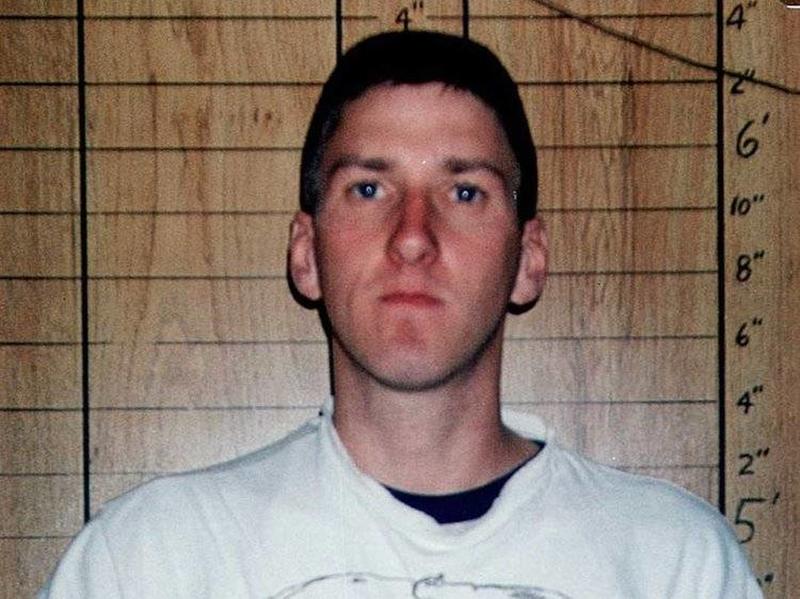
McVeigh was executed by lethal injection on June 11, 2001, at the Federal Correctional Complex in Terre Haute, Indiana. His execution was carried out in a considerably shorter time than most inmates awaiting the death penalty; most convicts on death row in the United States spend an average of fifteen years there. Terry Nichols and Michael Fortier were also convicted as conspirators in the plot. Nichols was sentenced to 8 life terms for the deaths of 8 federal agents, and to 161 life terms without parole by the state of Oklahoma for the deaths of the others (including one fetus). Fortier was sentenced to 12 years imprisonment and has since been released. His Last Meal: Two pints of mint chocolate chip ice cream.
Tom Ketchum - who had become known as "Black Jack" when misidentified with another hombre he resembled - was the last man to hang in America for attempting to rob a train. Given the way the authorities in Clayton, N.M., conducted the job, that's probably for the best.
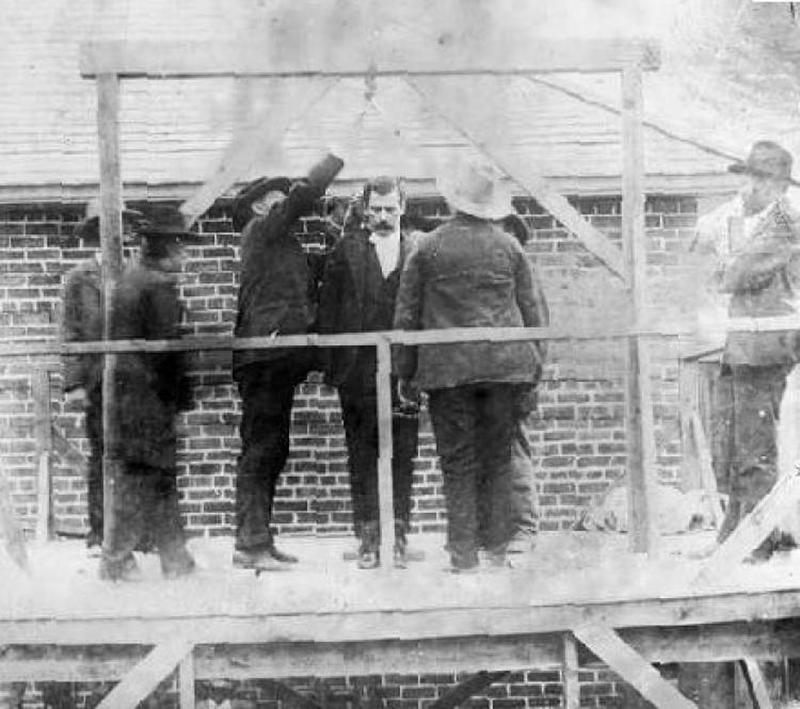
During his execution, when the body dropped through the trap the half-inch rope severed the head as cleanly as if a knife had cut it. The body pitched forward with blood spurting from the headless trunk. The head remained in the black sack and flew down into the pit. The drop of the body was seven feet and the noose was made so it slipped easily. Ketchum was a heavy man, and the weight of the body, with the easy-running noose, caused the rope to cut the head cleanly off. Dr. Slack pronounced life extinct a little over five minutes from the time the body dropped through the trap. It is stated too much of a drop was given for so heavy a man.
Johnathan Moore was sentenced to death in 1996 for gunning down San Antonio Police Officer Fabian Dale Dominguez in a botched home invasion. After Moore went to death row in Texas, one of his friends on the outside started a page for him on MySpace.com, where Moore lists "fascism," "feminism" and "squirrels" as some of his interests. Johnathan Moore repeatedly apologized to the officer's widow, Jennifer.
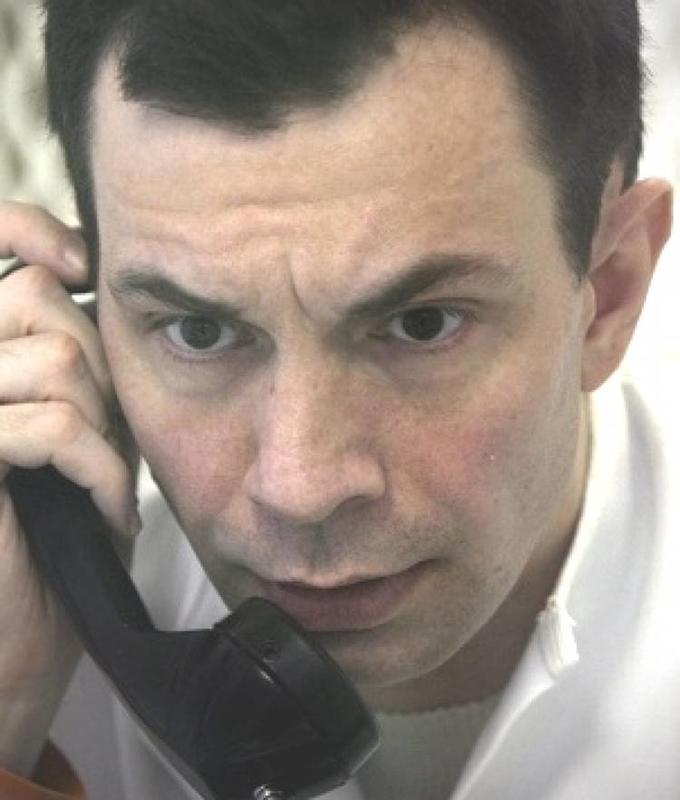
His final statement before death: "Jennifer, where are you at? I'm sorry, I did not know the man but for a few seconds before I shot him. It was done out of fear, stupidity, and immaturity. It wasn't until I got locked up and saw the newspaper. I saw his face and his smile and I knew he was a good man. I am sorry for all your family and my disrespect - he deserved better. Sorry Gus. I hope all the best for you and your daughters. I hope you have happiness from here on out. Quit the heroin and methadone. I love you dad, Devin, and Walt. We're done Warden."
Burris was convicted of the Jan. 29, 1980, murder of Indianapolis cab driver Kenneth Chambers, whom he robbed of $40, then ordered to strip naked before shooting him point-blank in the head and leaving his body in an alley. Witnesses to the execution said Burris said, "beam me up" prior to being given a lethal dose of chemicals in the execution chamber at Indiana State Prison. He was pronounced dead just before 1 a.m. local time. The Indiana Supreme Court turned down his final appeals.

Death penalty opponents said Burris should not have been executed. Amnesty International said Burris was brain-damaged after he shot himself accidentally with his own gun in a robbery attempt in 1976, and that Burris received a miserable legal defense at his murder trial. During the death penalty phase of the trial, jurors did not learn of his childhood living amid prostitutes and drug dealers. Burris had been told his real mother abandoned him in a trash can as a baby.
Mr. Drew, 35, of West Pawlet, Vt., was convicted in the 1983 beating and stabbing death of 17-year-old Jeffrey Mays of Birmingham, Ala. Mr. Mays and a companion had picked up Mr. Drew, who was hitchhiking toward Houston from Lake Charles, La. Mr. Drew maintained that he saw another hitchhiker picked up separately, Earnest Puralewski, kill Mr. Mays but that he was drunk and afraid to intervene in the fight.
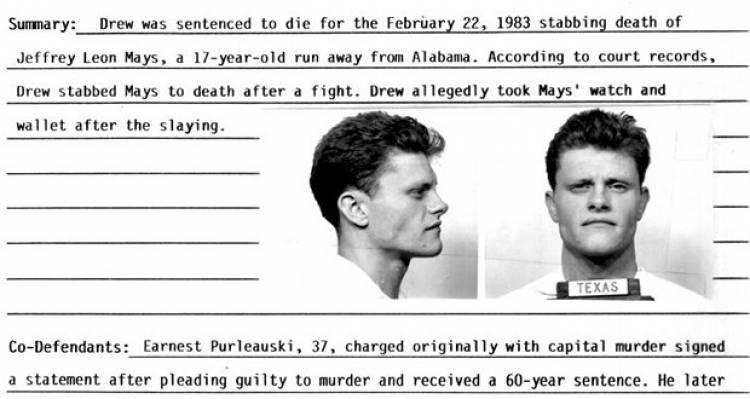
Drew's final words before execution: "(First two or three words not understood.) I don't know why Marta Glass wasn't allowed in here. I love you all. Keep the faith. Remember the death penalty is murder. They are taking the life of an innocent man. My attorney, Ron Kuley [illegible], will read my letter at a press conference after this is over. That is all I have to say. I love you all."
Victor Feguer was a convicted murderer and the last federal inmate executed in the United States before the moratorium on the death penalty following Furman v. Georgia, and the last person put to death in the state of Iowa. While at the time the news media paid little attention to Victor Feguer or his execution, Timothy McVeigh's execution sparked renewed media interest in Feguer.
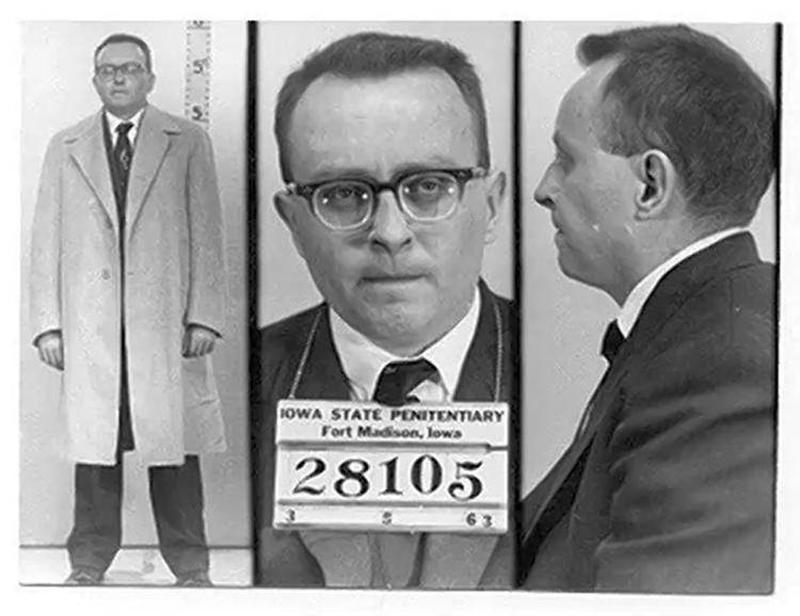
For his last meal, Feguer didn't want anything fancy; in fact, his request was not even really a meal at all. All he wanted was a single olive with the pit still in it. He told guards he hoped an olive tree would sprout from his grave as a sign of peace. On March 14, 1963, Feguer sat in an all-night vigil with a Roman Catholic priest. Between 4 and 5 in the morning of March 15, Feguer was given a new suit for his execution. Two guards escorted him to the gallows, and he was hanged at dawn. After Feguer was pronounced dead, authorities found the pit from the olive in one of his suit pockets.
Peter Manuel was an American-Scottish serial killer who was convicted of murdering a total of seven people across Lanarkshire and southern Scotland between 1956 and his arrest in January 1958, and is believed to have murdered two more, nine in all. Prior to his arrest, the media nicknamed the unidentified killer "the Beast of Birkenshaw". Manuel was hanged at Glasgow's Barlinnie Prison; he was the second to last prisoner to die on the Barlinnie gallows.
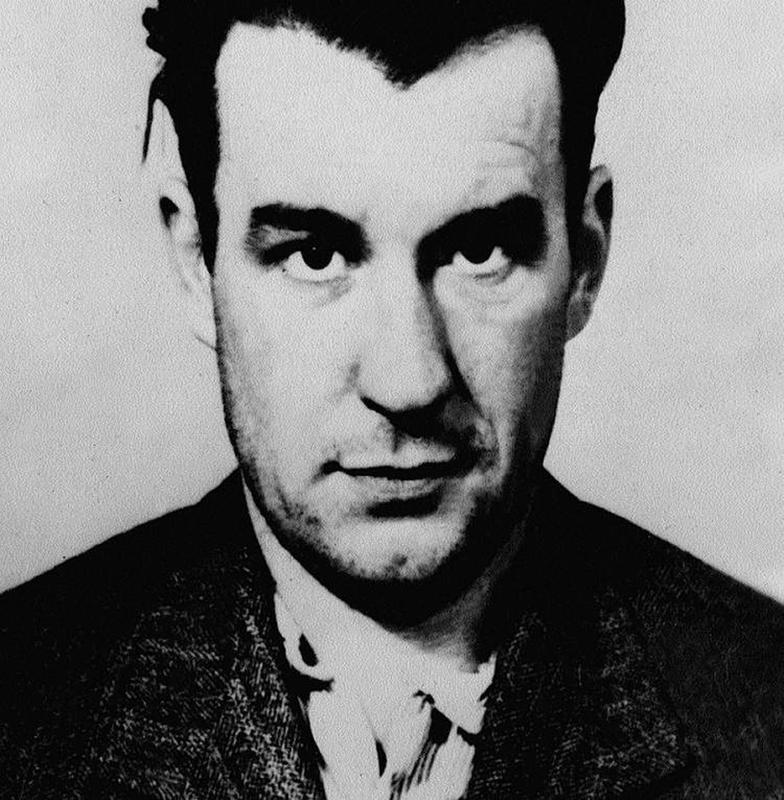
On 11 July 1958, Manuel was hanged on the gallows at Barlinnie Prison by Harry Allen. His last words are reported to have been: "Turn up the radio and I'll go quietly". For his final meal, Peter Manuel requested the following: fish, chips, tomatoes, and tea.
Adolf Eichmann was a German Nazi lieutenant colonel and one of the major organizers of the Holocaust. He was tasked by Reinhard Heydrich (general/lieutenant general) with facilitating and managing the logistics involved in the mass deportation of Jews to ghettos and extermination camps in Nazi-occupied Eastern Europe during World War II. In 1960, he was captured in Argentina by the Mossad, Israel's intelligence service. He was found guilty of war crimes in a widely publicised trial in Israel, and was hanged in 1962.
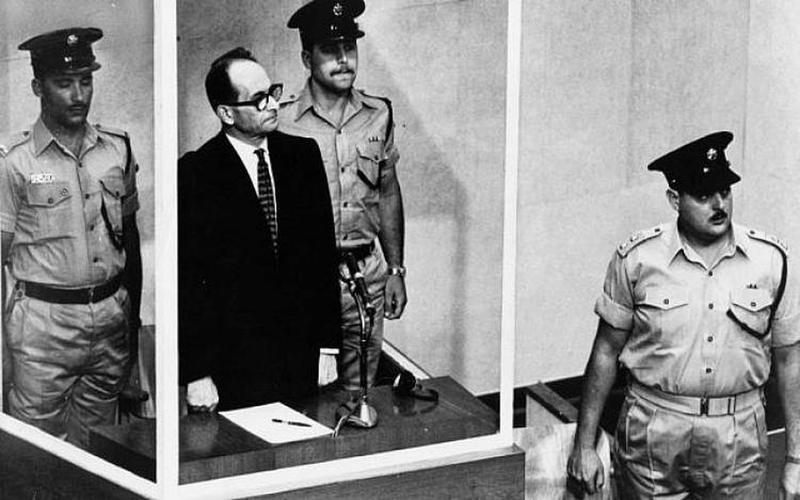
"I hope that all of you will follow me," (to the men escorting him to the gallows) but generally reported as "Long live Germany. Long live Argentina. Long live Austria. These are the three countries with which I have been most connected and which I will not forget. I greet my wife, my family, and my friends. I am ready. We'll meet again soon, as is the fate of all men. I die believing in God." His last meal: A bottle of red wine.
In 1980, 25 year old nurse Ann Marie Roche was kidnapped from the parking lot of Wake Medical Center where she worked by Rook. Miss Roche was then driven to a vacant field, where she was raped and then murdered by Rook, who subsequently drove his vehicle over her body. He =tried to blame society for the murder. Because he didn't get the "help" he needed as a kid. And when we started paying attention to him (for breaking the law) everything that was done just made it all worse.
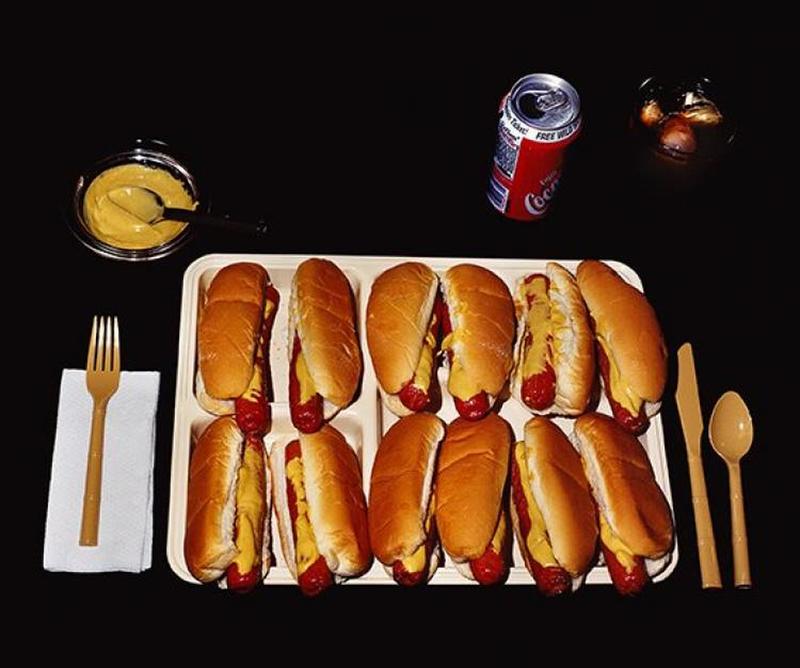
During execution John William Rook, 27 years old, said, 'Freedom, freedom at last, man - it's been a good one,' and died at 2:11 A.M., said Renee McCoy, a spokesman for the Correction Department. He was allowed to wear western boots and a Harley-Davidson T-shirt. His last meal: 12 hotdogs (with mustard) and a can of Coke
Holton, a Gulf War Veteran, was 36 years old when he shot his three young sons and their half-sister with a Chinese-made semi-automatic rifle on November 30, 1997, at the garage where he worked in Shelbyville, Tennessee. Holton was divorced, and his ex-wife had custody of the children. About an hour later, Holton turned himself in to the Shelbyville police; he told investigators that he had killed the children because "families should stay together; a father should be with his children." He said he had also planned to kill his ex-wife and then himself, but had changed his mind.
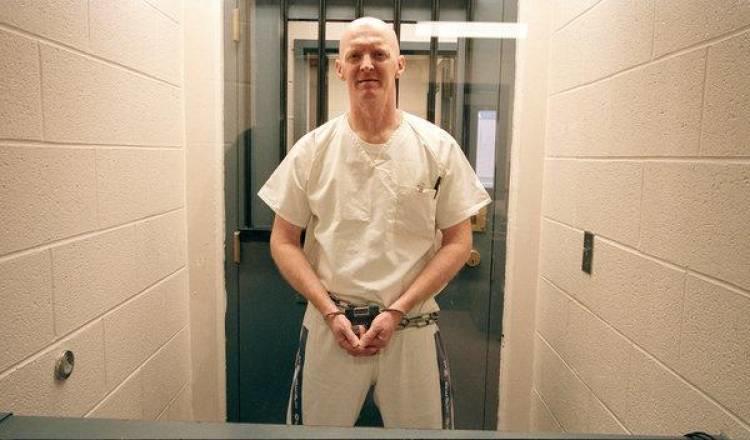
Holton chose to die in the electric chair, rather than by lethal injection, which is now the standard method of execution in Tennessee. Death-row inmates who committed their capital crime when the electric chair was still the official execution method are permitted to choose between the two methods. Holton was the first person to be executed by electrocution in Tennessee in 47 years. Moments before his execution, prison warden Ricky Bell asked Holton if he had any final words. He replied: "Two words: I do". He decided against the traditional special last meal before his execution and instead, ate the regular prison meal which consisted of riblets on a bun, mixed vegetables, baked beans, white cake with white icing and iced tea.
James W. Rodgers was an American who was sentenced to death by the state of Utah for the murder of miner Charles Merrifield in 1957. In his final statement before his execution by firing squad in 1960, Rodgers requested a bulletproof vest. His execution by firing squad would be the last to be carried out in the United States before capital punishment was halted by the U.S. Supreme Court. The death penalty was reinstated in 1976 and the first person executed in Utah subsequent to that date was Gary Gilmore in 1977.
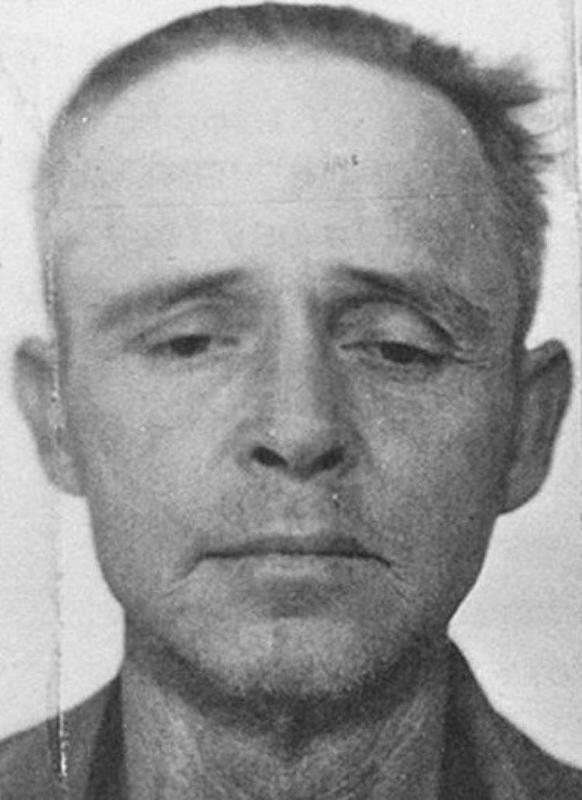
On the morning of March 30, 1960, Rodgers was driven to the execution site on a clay flat about a mile (1.6 km) from the prison while accompanied by San Juan County Sheriff Seth Wright and a prison chaplain. When asked for a final statement, Rodgers continued to insist that he was innocent and said, "I done told you my last request ... a bulletproof vest." He was dressed in denim and offered a coat, to which he replied, "Don't worry, I'll be where it's warm soon." Rogers was strapped to a wooden chair inside a 20-foot (6.1 m) canvas enclosure.
Simmons was convicted of the 1996 murder of Jeffrey Wolfe as well as the kidnapping and rape Wolfe's female friend. Simmons worked as a butcher and allegedly used those skills, and knives from work, to dismember Wolfe and scatter his body parts in an alligator infested Jackson County bayou.

He requested numerous items for his lat meal: One Pizza Hut medium Super Supreme Deep Dish pizza, double portion, with mushrooms, onions, jalapeno peppers, and pepperoni; pizza, regular portion, with three cheeses, olives, bell pepper, tomato, garlic and Italian sausage; 10 8-oz. packs of Parmesan cheese; 10 8-oz. packs of ranch dressing; one family size bag of Doritos nacho cheese flavor; 8 oz. jalapeno nacho cheese; 4 oz. sliced jalapenos; 2 large strawberry shakes; two 20-oz. cherry Cokes; one super-size order of McDonald's fries with extra ketchup and mayonnaise; and two pints of strawberry ice cream. This was a 28,974 calorie meal, of which he ate about half.
Carl Eugene Kelly was convicted and sentenced to death at only 22 years of age after he and accomplice, Thomas Graves, robbed a 7-Eleven in Waco, Texas, and killed two young men on September 2, 1980. After stealing $30 for drugs, Kelly and Graves abducted the store clerk, Steven Pryor, stole his car and drove him out to Cameron Park. They shot him several times then threw his body off a 60-foot cliff. David Riley, a transient who was asleep in Pryor's car, was also killed.
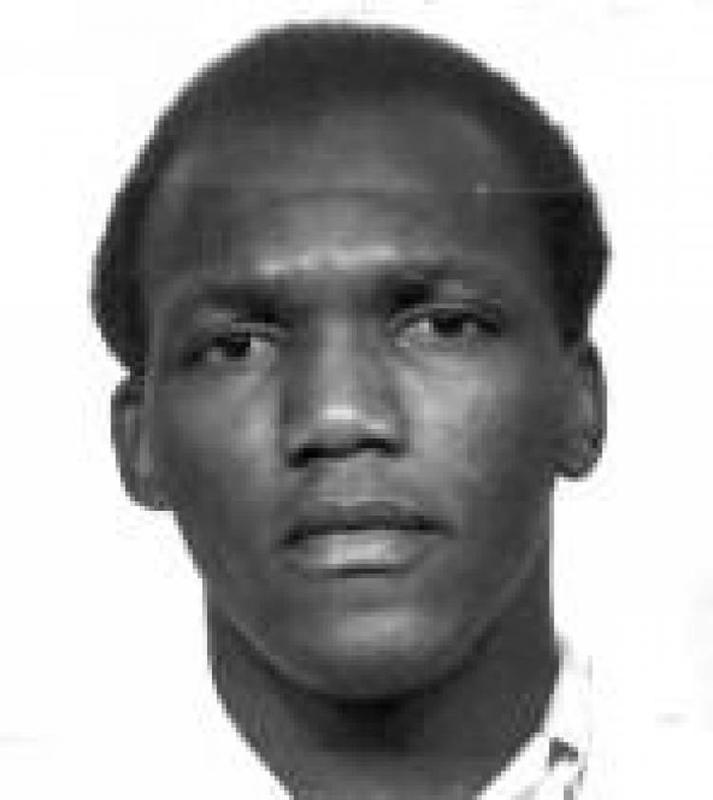
After his conviction, Kelly spent the next 12 years waiting his execution. The efforts of his lawyers were successful at delaying it through the appeals process. Appeals were made that Kelly hadn't intended on participating in the killings with Graves, that evidence used in the trial were seized illegally, and that he was on drugs at the time of the crime that affected his judgement. Kelly was executed by lethal injection on August 22, 1993 at 12:22 a.m. Charles L. Brown, the former assistant director for public information, witnessed the execution. "My job was to witness many executions, it was not because I was so pro capital punishment," Brown said. "I didn't really pay that much attention to them."
Billy C. Gardner was convicted of killing a cafeteria supervisor at Lake Highlands High School in Dallas. The victim was counting the day's receipts in a back room when she was confronted by Gardner and shot in the chest with a .357-caliber pistol. Gardner fled with about $1,600; the victim died 11 days later.
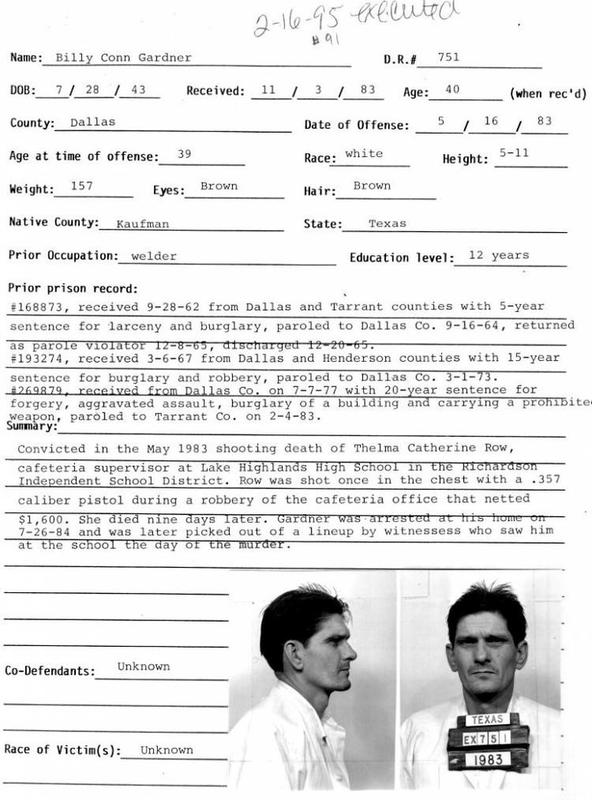
Billy Conn Gardner, said in a brief final statement before execution, "I forgive all of you, and I hope God forgives all of you all." His mother, Nettie Gardner, replied, "I've never been more proud of you than I am now." Mr. Gardner's relatives hugged and sobbed. His sister, Betsy Gray, said afterward: "My brother was convicted of a crime he did not commit. Tonight, once again, the State of Texas has committed cold-blooded murder. They are mass-murdering people here almost as bad as if we're in a war."
John Fearance said he returned home from his job at a car repair shop and found that his wife had baked him a casserole with meat. He said he liked his meat separate. In anger, this led him to stab a neighbor to death. He broke into at least two houses in his neighborhood, including Mr. Faircloth's. Mr. Faircloth's wife, Betty, identified Mr. Fearance as the man who stabbed her husband 19 times.
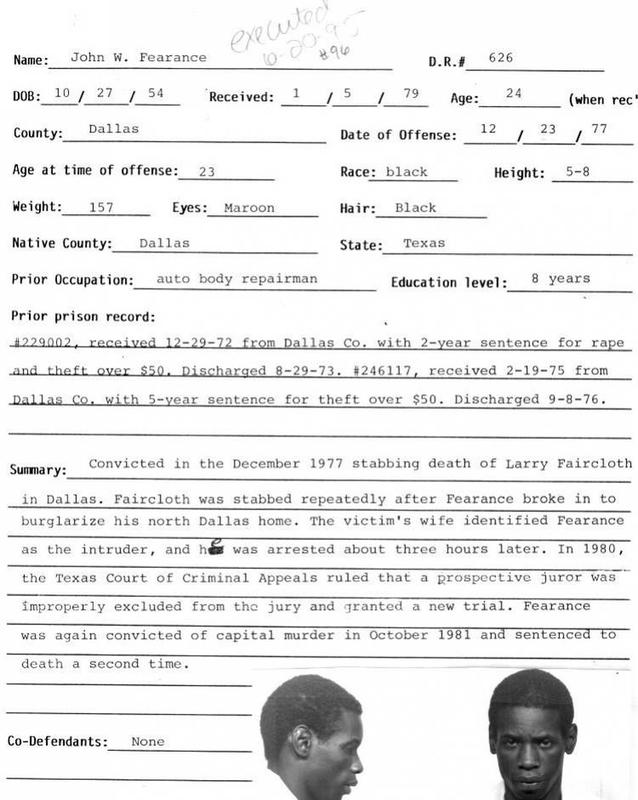
Fearance said he was remorseful but should not have been sentenced to death. "They should have tried me for temporary insanity," he said. Fearance ended a brief, rambling final statement before execution by saying he was ready to die. "I would like to say that I have no animosity toward anyone," Fearance said. "I made a mistake 18 years ago. I feel like I'm not responsible for what I done because I had a bad psychotic break. I lost control. I lost my life. I don't have any hate toward humanity. I didn't mean to and I'm ready to go meet my Maker." He said "hail Mary" through a gasp before falling silent.
On Oct. 6, 1978 Johnson and his "so-called" friend and accomplice, Carl Baltimore, decided to rob Wayne's Food Mart in Houston. Ed Thompson was the 75-year-old security guard on duty that night. When the two came in armed, demanding money, Thompson pulled his gun and fired a shot. Johnson then turned and pointed his .38 revolver toward Thompson and fired back five times. Later he claimed to doing this in self-defense. Thompson died of fatal shots to the head, while the robbers got away with only some change.

Johnson's execution took place on Sept. 19, 1995 at 12:24 a.m. He was only 40 years old. His final statement was, "I want the world to know I am innocent. I have found peace. Let's ride. I'm ready." He was put to death by lethal injection. It took only eight minutes for him to die.
Barefield, his brother and another accomplice abducted, robbed and raped Rice University student Cindy Rounsaville, 25, on April 21, 1986. When she tried to flee, Barefield shot her twice in the head. His brother was sentenced to 45 years in prison. The other accomplice got a life sentence for an unrelated rape-abduction. Evidence at his trial showed he shot her twice in the head as she was on her hands and knees in a field after running from the car.
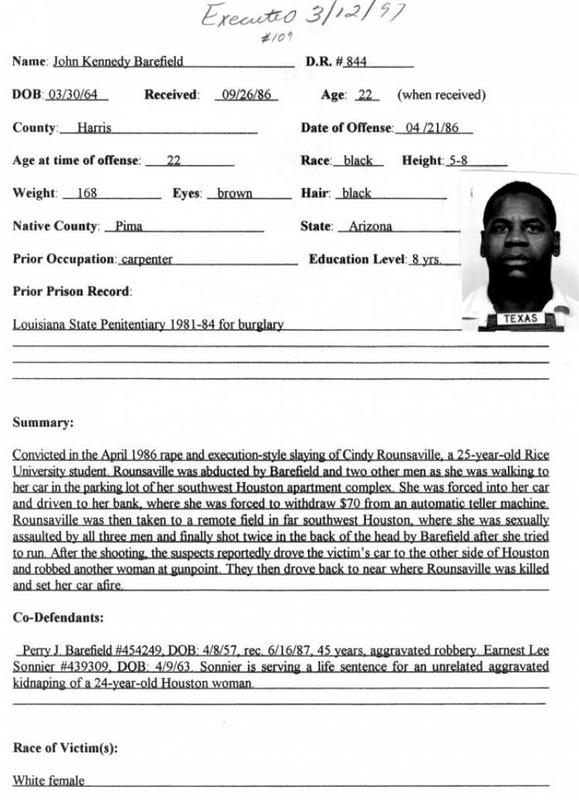
John Kennedy Barefield, 32, died by lethal injection for the abduction, rape and murder of Cindy Rounsaville, an architecture student at Rice University, in 1986. Mr. Barefield, who was born four months after the assassination of President John F. Kennedy, was named for him.
Livingston shot and killed Janet Caldwell, a 38-year-old mother of two, after she struggled during a purse-snatching in the parking lot of a northwest Houston grocery store the night of Aug. 10, 1983. At approximately 8:00 p.m. on the evening of August 10, 1983, Janet Caldwell left her home and drove to the Weingarten's grocery store located at West 43rd Street and Oak Forest Drive in Houston, Texas. She parked her black Chevrolet pickup truck in the parking lot on the west side of the store.
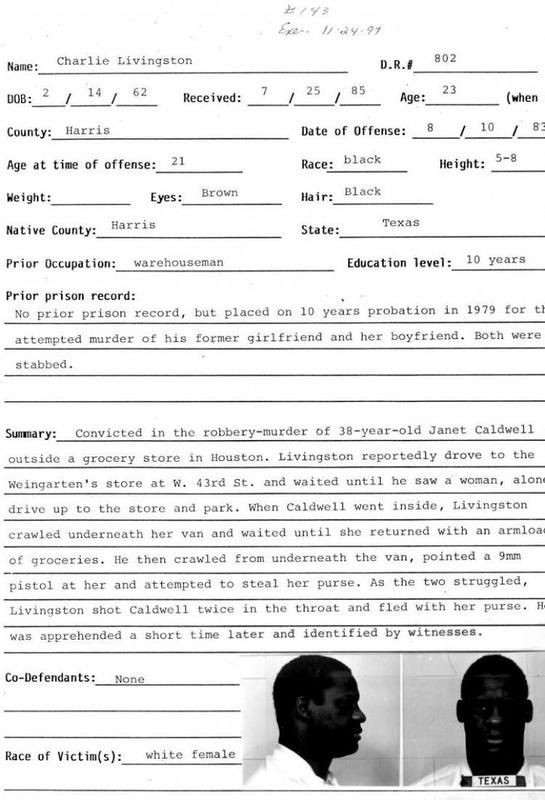
After she finished shopping, Caldwell left the store carrying two bags of groceries and a purse, and walked through the parking lot to her truck. She was shot and killed in the parking lot moments later. Several eyewitnesses testified to events they observed that night.
On November 6, 1982, at approximately 11:30 a.m., Jerry Harrison Chafin was found shot to death in a motel room in Greenville, Texas. Police were immediately summoned. The victim's personal items, including a college identification card, several credit card receipts, and clothing, were strewn across the bed. A bullet cartridge was found approximately eight inches from the victim's head. No identifiable fingerprints were discovered. An autopsy revealed that the victim had been shot three times in the chest and once in the hand at a distance of at least three to four feet. The cause of death was the gunshot wounds to the chest. Three .25 caliber bullets were recovered from the body.
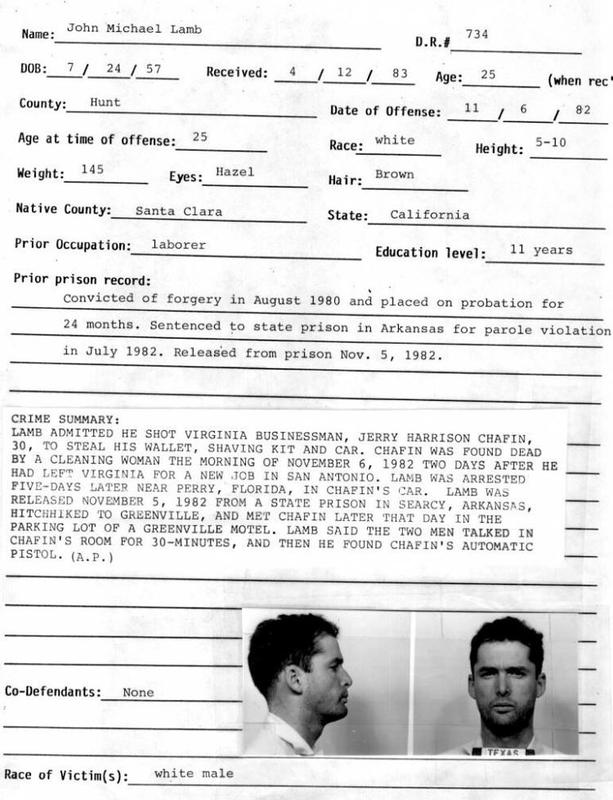
Lamb was arrested by a Florida state trooper on November 11, 1982, after an extended chase. Lamb was driving the victim's car. Recovered from Lamb's possession were the victim's billfold, driver's license, and credit cards. On November 13, 1982, two Texas law enforcement officers traveled to Florida to meet with Lamb. Lamb subsequently gave the Texas officers a written confession to the murder and robbery of the victim. Lamb's confession, in its entirety, reads as follows:
Aileen Wuornos was an American serial killer who murdered seven men in Florida between 1989 and 1990 by shooting them at point-blank range. Wuornos claimed that her victims had either raped or attempted to rape her while she was working as a sex worker, and that all of the homicides were committed in self-defense. She was convicted and sentenced to death for six of the murders and was executed by lethal injection on October 9, 2002.
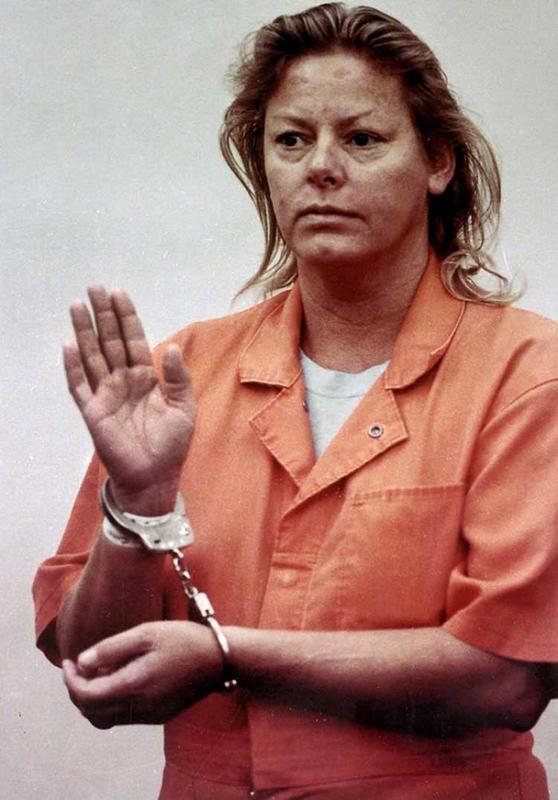
Her traumatic upbringing and physical as well as sexual abuse which was inflicted upon her have been partially linked to her development of a borderline personality disorder. Such severe trauma can also interrupt the structuralization of the mind at a developmental point and result in "primitive, dissociative, and splitting defenses to ward off the intensity of emotional and sexual stimulation that cannot be integrated as a child." The film Monster (2003) starred Charlize Theron as Wuornos. It chronicles Wuornos' story from childhood until her first murder conviction. The film earned Theron an Academy Award for Best Actress for playing Wuornos. She requested her last meal to be a cup of coffee.
Roberts stole a car from a woman at knifepoint at a San Antonio convenience store. Fearing that the car had been reported stolen, Roberts later drove into an apartment complex parking lot and abducted Jerry Velez in his own car at knifepoint. Roberts robbed Velez of his cash and ordered him to drive him out of San Antonio. Roberts ordered Velez out of the car on a desolate road outside the city at knifepoint. Velez lunged and Roberts stated he repeatedly stabbed Velez, then ran over his body as he drove away in the car. Roberts drove to Austin, called 911 and told the dispatcher he kidnaped and killed Velez. In a videotaped interview with police, Roberts gave a complete confession.
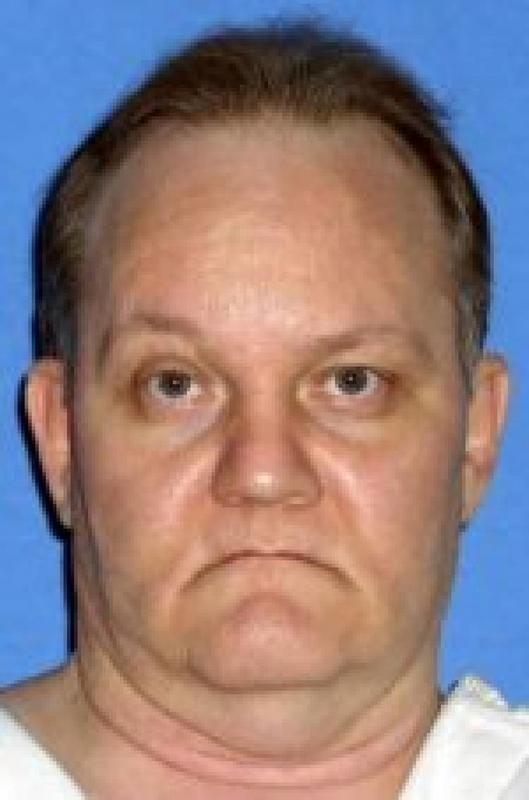
Roberts was upbeat and animated in the seconds before the lethal drugs were administered. "I've been hanging around this popsicle stand way too long, I want to tell you all. When I die, bury me deep, lay two speakers at my feet, put some headphones on my head and rock 'n' roll me when I'm dead. I'll see you in heaven some day." Roberts was smiling and mouthing "I love you all" to friends watching through a window, then said "I've got to go" and took his final breath. For his final meal he requested: Three Southern fried chicken breasts, two bacon, lettuce and tomato sandwiches, three enchiladas, ground beef, two grilled pork chops, six corn tortillas, four deviled eggs, 12 green olives with Italian ketchup, butter beans and cabbage seasoned with hambone, broccoli with cheese sauce, fried onion rings, french fries, tomato, lettuce, cheese, picante sauce, onions and jalapenos.